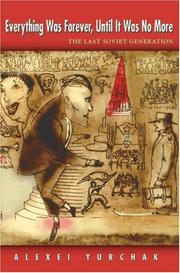| Listing 1 - 2 of 2 |
Sort by
|

ISBN: 0691121176 9780691121178 0691121168 9780691121161 1400849101 9781400849109 1299758533 Year: 2005 Publisher: Princeton: Princeton university press,
Abstract | Keywords | Export | Availability | Bookmark
 Loading...
Loading...Choose an application
- Reference Manager
- EndNote
- RefWorks (Direct export to RefWorks)
Soviet socialism was based on paradoxes that were revealed by the peculiar experience of its collapse. To the people who lived in that system the collapse seemed both completely unexpected and completely unsurprising. At the moment of collapse it suddenly became obvious that Soviet life had always seemed simultaneously eternal and stagnating, vigorous and ailing, bleak and full of promise. Although these characteristics may appear mutually exclusive, in fact they were mutually constitutive. This book explores the paradoxes of Soviet life during the period of "late socialism" (1960s-1980s) through the eyes of the last Soviet generation. Focusing on the major transformation of the 1950s at the level of discourse, ideology, language, and ritual, Alexei Yurchak traces the emergence of multiple unanticipated meanings, communities, relations, ideals, and pursuits that this transformation subsequently enabled. His historical, anthropological, and linguistic analysis draws on rich ethnographic material from Late Socialism and the post-Soviet period. The model of Soviet socialism that emerges provides an alternative to binary accounts that describe that system as a dichotomy of official culture and unofficial culture, the state and the people, public self and private self, truth and lie--and ignore the crucial fact that, for many Soviet citizens, the fundamental values, ideals, and realities of socialism were genuinely important, although they routinely transgressed and reinterpreted the norms and rules of the socialist state.
#KVHA:Cultuurgeschiedenis Sovjet Unie --- Socialism and culture --- Soviet Union --- Civilization. --- Intellectual life. --- Culture and socialism --- Culture --- Intellectual life --- #KVHA:Cultuurgeschiedenis; Sovjet Unie --- Civilization --- Socialisme et culture --- URSS --- Civilisation --- Vie intellectuelle --- Socialism and culture - Soviet Union --- Soviet Union - Civilization --- Soviet Union - Intellectual life
Book

ISBN: 9780997367577 Year: 2018 Publisher: Chicago : HAU Books,
Abstract | Keywords | Export | Availability | Bookmark
 Loading...
Loading...Choose an application
- Reference Manager
- EndNote
- RefWorks (Direct export to RefWorks)
Fakes, forgery, counterfeits, hoaxes, bullshit, frauds, knock offs-such terms speak, ostensibly, to the inverse of truth or the obverse of authenticity and sincerity. But what does the modern human obsession with fabrications and frauds tell us about ourselves? And what can anthropology tell us about this obsession? This timely book is the product of the first Annual Debate of Anthropological Keywords, a collaborative project between HAU, the American Ethnological Society, and L'Homme, held each year at the American Anthropological Association Meetings. The aim of the debate is reflect critically on keywords and terms that play a pivotal and timely role in discussions of different cultures and societies, and of the relations between them. This book, with multiple authors, explodes open our common sense notions of "novelty," "originality," and "truth," questioning how cultures where deception and mistrust flourish seem to produce effective, albeit opaque, forms of sociality.
| Listing 1 - 2 of 2 |
Sort by
|

 Search
Search Feedback
Feedback About UniCat
About UniCat  Help
Help News
News